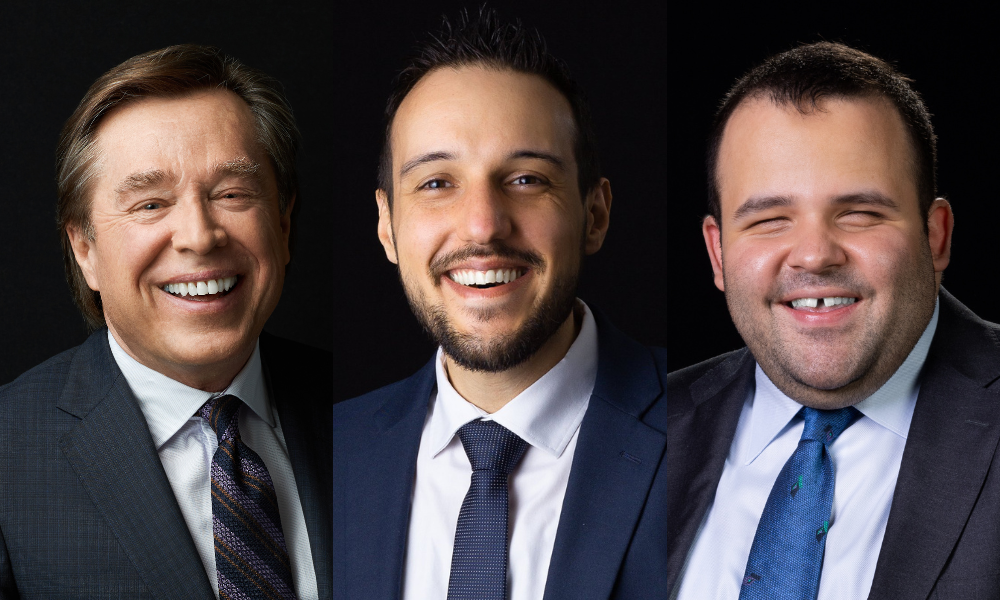
Lawyers at Conway Baxter Wilson Litigation LLP win OBA award for equality, diversity and inclusion

Accommodating people of different backgrounds and experiences is a hot topic these days. Companies all say they want to make their workplaces as diverse and inclusive as possible, but fewer actually “walk the talk.”
Fortunately, Ottawa-based Conway Baxter Wilson LLP is living up to lofty goals and embracing equality, diversity, and inclusion as part of the firm’s business. Three of its lawyers—Thomas Conway, Abdalla Barqawi, and Mohammed Elshafie—the latter two are both legally blind—were recently recognized by the Ontario Bar Association for setting the bar for accommodation and creating a space where all lawyers can thrive.
“This firm, led by Tom and promoted by Abdalla and Mohammed, has demonstrated exceptional leadership in moving the dial on accommodations for lawyers living and working with disabilities in the legal profession,” says OBA president Kelly McDermott. “They have set the gold standard in workplace accommodations. Their focus is on providing an environment where lawyers living with disabilities can thrive and shine and not simply adapt.”
She adds that their work “exemplifies the transformative power of inclusivity and removing barriers to success for all members of our profession.”
Each year, the OBA President’s Award recognizes the significant contribution of an individual or organization that, in the view of the current OBA president, has significantly impacted the advancement of justice. Previous winners include the Hon. Roy McMurtry (2010), the Canadian Cross-Border Legal Coalition (2018) and Kristin Taylor, Carla Potter, Ardy Mohajer and Noble Chummar (2022).
As Conway sees it, hiring the two young lawyers and learning to adapt to the accommodations they need to thrive was well worth it. For example, Barqawi, who was hired first, was at a large Bay Street firm and was poached by Conway because “he was an excellent lawyer—his credentials were superb.”
The fact that Barqawi is visually impaired - he has retinitis pigmentosa - was “not a big deal for us,” says Conway, noting that perhaps being a smaller firm made it easier to accommodate
“We had everybody meet him, and the consensus is we gotta have this guy - and whatever he needs to work here, we’ll do it.”
As it turns out, Conway says, what was needed “wasn’t really all that much.”
Elshafie, born blind, heard about Barqawi being at Conway even before he was called to the bar and decided that Conway was the firm for him. A native of Egypt and a supporter of the Arab Spring movement, he articled at Conway after getting his law degree at Harvard University.
“He blew everyone’s socks off with his erudition and his oration skills,” Conway says, adding that “he had the pleasure” of walking Elshafie across the stage when he was called to the bar by virtue of being a treasurer emeritus of the Law Society of Ontario.
Barqawi says that while he may have been poached by Conway, he was actively looking to move back to Ottawa, where his family lives, and heard from friends that he “should really talk to the people at Conway.”
After being hired, Barqawi says it was “incredible” how much support he received, with “even one of the most senior guys at the firm [Conway], who is a well-known litigation lawyer, helping this blind guy walk around downtown Ottawa, and helping him get to different court houses.”
More than that, he adds, is the firm’s ethos of giving him “every opportunity” to reach his potential as a lawyer. It’s part of the firm culture, he says, “which comes from the top and works its way downward.”
Elshafie shares the same sentiment. As a student at Harvard, “When I looked up the firm, one of the things I noticed was a complicated commercial appeal in Ontario that the firm had been involved in, and it made me think there’s a great deal to learn from this firm.”
Knowing that Barqawi was also at Conway “reassured me they had a good approach to accommodation.”
As for Conway helping him cross that stage when admitted to the bar, Elshafie says it solidified his belief that his boss was a mentor and “the spiritual godfather of my legal career.”
The three lawyers have also been involved in the OBA’s Peer Support Network For Lawyers Living with Disabilities initiative, hoping that more attention will be given to supports that provide solutions or workarounds to help people like Barqawi and Elshafie work more independently.
Barqawi points out one example of the need for improvement: CaseLines. Purchased by the Ministry of the Attorney General, the Ontario Superior Court of Justice uses this cloud-based document-sharing storage and e-hearing platform for remote and in-person court proceedings. It is being rolled out in stages and across practice areas and locations.
“Mohammad and I can’t use it as anyone else can,” Barqawi says. “it doesn’t really work with screen readers, so we’ve had to use workarounds because the government has not considered people who don’t see.”
Elshafie notes that despite such challenges, Conway lawyers and employees are ready to help the two lawyers when needed, often anticipating their needs or obtaining the right software to assist in accommodation.
Barqawi does note that some disabilities are easier to accommodate than others. Physical disabilities, for example, are a question of logistics, equipment and planning. Learning disabilities or mental health disabilities are more challenging because they are more personal to the individual.
“Still, the right approach is to help all those who want to succeed and enable them to achieve their goals.”
As Conway says, “There are times when all of us need help, so we have to be prepared to give it, whoever you are.”